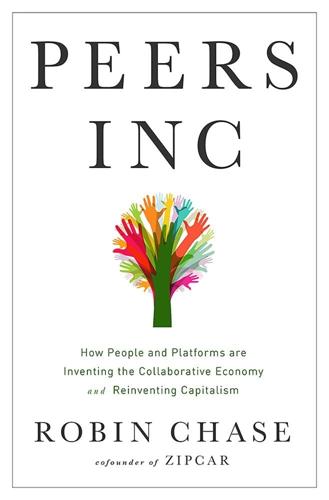
Peers Inc: How People and Platforms Are Inventing the Collaborative Economy and Reinventing Capitalism
by
Robin Chase
Published 14 May 2015
It leverages the ability of individuals and small actors to experiment, adapt, iterate, and evolve. When done well, Peers Inc can create change at a pace, scale, and quality we previously thought impossible. Peers Inc is leading the transition from industrial capitalism to the collaborative economy. In this book I delve into the right-hand column and answer many questions surrounding the collaborative economy: • What is the economic underpinning behind this transformation? • What is the organizational structure that powers it? • What does it mean for employment and for how people find work and earn a living? • What miracles does this paradigm makes possible?
…
Dan Bieler, a principal analyst on Forrester Research’s Business Technology Futures team, writes that “rising customer expectations and faster product life cycles are forcing companies to adapt to a new style of business: ‘the collaborative economy.’ ” Bieler continues, “Collaboration not only connects customers, partners, and employees in the context of a single issue or incident; it can also be a massive driver of innovative new products, stronger business growth, and ultimately even improved social welfare. As a result, companies, industries, and entire economies that used to operate in silos will have to open themselves up and embrace the collaborative economy.”3 Dries Buytaert, the founder of Drupal, has observed that “society is undergoing tremendous change right now—the sharing and collaboration practices of the Internet are extending to transportation (Uber), hotels (Airbnb), financing (Kickstarter, Lending Club), and music services (Spotify).
…
This is how Peers Inc organizations started rewiring capitalism. Where the industrial economy concentrates power and wealth, the collaborative economy succeeds by distributing it. So for those in power, enjoying the fruits of the status quo, this change will be especially hard. The old guard will fight to protect what it has from an uncertain future. The industrial economy, its regulations, and its biggest companies will not transform overnight. But we will end up by going down the Peers Inc path—of that I have no doubt. Why? I have observed that in the new collaborative economy, where we are networked and resources are highly accessible, the following are almost always true.
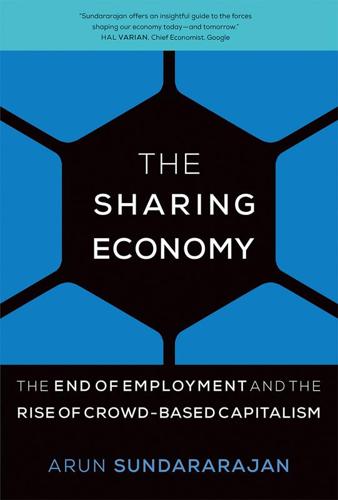
The Sharing Economy: The End of Employment and the Rise of Crowd-Based Capitalism
by
Arun Sundararajan
Published 12 May 2016
Francesca Pick, “What OuiShare Means to Me,” https://medium.com/ouishare-connecting-the-collaborative-economy/what-ouishare-means-to-me-4f275d9917f. 6. For Gorenflo’s description of Shareable, see http://shareable.net/about. The interview is available at http://www.collaborative-economy.com/project-updates/sharing-economy-with-neal-gorenflo-shareable. A summary is provided at http://www.shareable.net/blog/interviewed-shareables-neal-gorenflo-on-the-real-sharing-economy. 7. A collection of some of Owyang’s blog posts is available at “Quick Guide: The Collaborative Economy Body of Work for Corporations (updated June 2015),” http://www.web-strategist.com/blog/2013/08/22/table-of-contents-the-collaborative-economy. 8.
…
In the end, you will have to choose one or the other.”8 The inherent tension in making this choice is perhaps what leads to the disappointment Léonard refers to. It is also reminiscent of the sentiment expressed by the public intellectual Diana Fillipova in her 2014 essay, “The Mock Trial of the Collaborative Economy,” in which she noted: “Of course, as with technology, the problem is not the collaborative economy itself but, at least partly, the way we have been thinking about it and the unlimited hopes we were putting into it.”9 This discussion within OuiShare as well as at their Fest, mirrors both the evolving use of the term “sharing economy” and the nature of the exchange it is used to describe.
…
In other words, for each category there are gradients that draw attention to the specificity of various sharing economy activities. Owyang’s Collaborative Economy Honeycomb also clearly illustrates that as much as the sharing economy is being used to fuel pure sharing and micro-enterprises, larger corporations also embrace it. Today’s crowd-based capitalism appears to create new institutions for organizing economic activity that offer value for people across the economic spectrum both as consumers and producers. The same may be true for the new generation of decentralized peer-to-peer technologies that are the subject of our next chapter. Figure 3.3 Collaborative Economy Honeycomb. Notes 1. Thomas W.
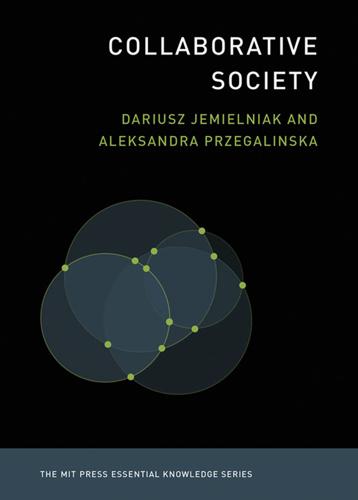
Collaborative Society
by
Dariusz Jemielniak
and
Aleksandra Przegalinska
Published 18 Feb 2020
For instance, Italy passed a bill in 2016 that defines the sharing economy as an “economic system generated by the optimization and shared allocation of space, time, goods, and services through digital platforms.”26 Similarly, the EU Commission defined collaborative economy as a brokerage between individual service providers and recipients.27 Even more important in the general discourse are the plethora of authors who believe that collaborative economy—particularly commons-based peer production—has the potential to transform the capitalistic system and the whole of society into something much less corporate driven and more equality based.28,29 Proponents of open collaboration argue that online connectivity allows provisioning based on access rather than ownership, which enables better use of previously underutilized assets like cars, private rooms, apartments, and tools.30,31 The thriving marketplace that exists as a result, they say, transfers the burden of maintenance to the provider while the sharing platform reaps the benefits.
…
While only moderately affecting trade, these repositories redefine not only the traditional knowledge hierarchy, but also our trust in intimacy, matchmaking, and friendship, as well as in public and private communication. Clearly, the consequences of the open collaboration phenomenon surpass recent reforms in capitalism. Although we describe various effects the collaborative economy has had on all our lives, we focus in this book on important social aspects of collaborative society. We are entering an age of networked individualism fostered by perpetual online connectedness.35 It relies on a highly cooperative collective, irrespective of any financial dimension. Unsurprisingly, the future development of collaborative society likely depends on the performance of Big Data analytics, the use of machine learning, and the development of the Internet of Things.
…
Although we don’t dismiss the major influence collaboration has on capitalism, we prefer to emphasize its impact on other areas, such as culture, intimacy, and relationships. To that end, we organize our book in the following way. In chapter 2, “Neither ‘Sharing’ nor ‘Economy,’” we discuss the key concepts of sharing economy, collaborative economy, platform capitalism, cooperativism, and gig economy. We criticize the persistence of “sharing economy” as a term in popular and academic discourse by critically analyzing its oversimplistic and fuzzy meaning. We also point to the rhetorical hijacking of the term by many corporations. Although we recognize the explanatory value of the other concepts, we furthermore demonstrate that many aspects of the ongoing major change in society do not necessarily relate predominantly to the economy.
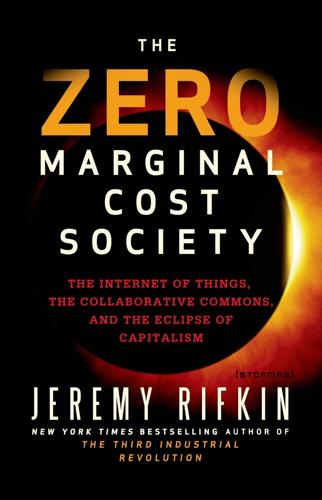
The Zero Marginal Cost Society: The Internet of Things, the Collaborative Commons, and the Eclipse of Capitalism
by
Jeremy Rifkin
Published 31 Mar 2014
He clearly joins the dots on how the likes of 3D printing, crowdfunding, and online education platforms are all connected and describes the disruptions that lie just around the corner for most sectors.” —Rachel Botsman, author of What’s Mine is Yours: How Collaborative Consumption Is Changing The Way We Live “Jeremy Rifkin understands that it’s people and communities who are at the heart of the new economic paradigm. People all over the world are building the collaborative economy and Rifkin’s thoughtful analysis further illustrates that this is an idea whose time has come.” —Natalie Foster, executive director of peers.org The Zero Marginal Cost Society The Zero Marginal Cost Society The Internet of Things, the Collaborative Commons, and the Eclipse of Capitalism Jeremy Rifkin THE ZERO MARGINAL COST SOCIETY Copyright © Jeremy Rifkin All rights reserved.
…
In the Collaborative Age, learning is regarded as a crowdsourcing process and knowledge is treated as a publically shared good, available to all, mirroring the emerging definition of human behavior as deeply social and interactive in nature. The shift from a more authoritarian style of learning to a more lateral learning environment better prepares today’s students to work, live, and flourish in tomorrow’s collaborative economy. The new collaborative pedagogy is being applied and practiced in schools and communities around the world. The educational models are designed to free students from the private space of the traditional enclosed classroom and allow them to learn in multiple open Commons, in virtual space, the public square, and in the biosphere.
…
Reducing addictive consumption, optimizing frugality, and fostering a more sustainable way of life is not only laudable, but essential if we are to ensure our survival. But even here, there are winners and losers. The still-dominant capitalist system believes it can find value in the collaborative economy by leveraging aspects of the sharing culture toward new revenue-generating streams. Still, whatever profit it can squeeze out of the growing networked Commons will pale in comparison to the ground it loses. Although hotels will continue to book, they are already seeing their markets decline as millions of young people migrate to Airbnb and Couchsurfing.
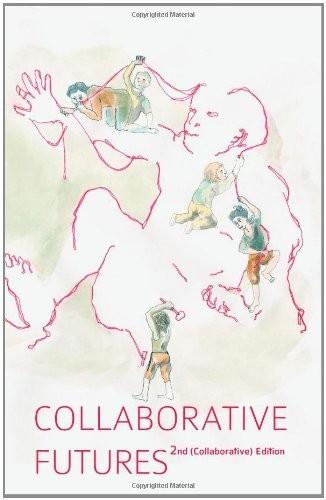
Collaborative Futures
by
Mike Linksvayer
,
Michael Mandiberg
and
Mushon Zer-Aviv
Published 24 Aug 2010
INFO User adamhyde has saved chapter "About this Book". INFO User adamhyde has saved chapter "About this Book". JOINED AlanToner INFO User AlanToner has saved chapter "Motivations for Collaboration". INFO User ela has saved chapter "Collaborative Economies". INFO User adamhyde has saved chapter "About this Book". INFO User Marta has saved chapter "Generosity". INFO User ela has saved chapter "Collaborative Economies". INFO User adamhyde has saved chapter "Boundaries of Collaboration". JOINED sophie_k INFO User mushon has saved chapter "Anonymous". INFO User adamhyde has saved chapter "The New York Special Edition". INFO User mandiberg has saved chapter "Anonymous".
…
INFO User adamhyde has renamed chapter "The New York Special Edition" to "A ribution Imbalance". JOINED Marta 157 INFO User mandiberg has saved chapter "Introduction". JOINED Marta INFO User adamhyde has saved chapter "Boundaries of Collaboration". INFO User sophie_k has saved chapter "Collaborative Economies". INFO User mandiberg has saved chapter "Anonymous". INFO User mandiberg has saved chapter "Anonymous". INFO User mandiberg has saved chapter "Anonymous". INFO User adamhyde has saved chapter "How this book is wri en". INFO User Marta has saved chapter "Anonymous Collaboration". JOINED agoetzke INFO User adamhyde has saved chapter "Boundaries of Collaboration".
…
INFO User Marta has saved chapter "Death is not the end". INFO User adamhyde has saved chapter "Se ing the Future Free: Ownership, Control and Conflict". INFO User Marta has saved chapter "Death is not the end". INFO User Marta has saved chapter "Death is not the end". INFO User mandiberg has saved chapter "Collaborative Economies". INFO User mushon has saved chapter "Solidarity". INFO User adamhyde has saved chapter "Beyond Education". INFO User sophie_k has saved chapter "Problematizing A ribution". 159 INFO User AlanToner has saved chapter "The Freedom to Merge, The Freedom to Fork". INFO User AlanToner has saved chapter "The Freedom to Merge, The Freedom to Fork". mandiberg: yo patrick!
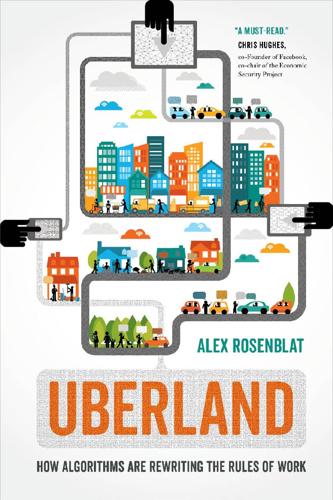
Uberland: How Algorithms Are Rewriting the Rules of Work
by
Alex Rosenblat
Published 22 Oct 2018
Jack, “Imagining the Sharing Economy.” 19. Robin Chase, “Bye, Bye Capitalism: We’re Entering the Age of Abundance,” Backchannel, July 16, 2015, https://medium.com/backchannel/see-ya-later-capitalism-the-collaborative-economy-is-taking-over-34a5fc3a37cd. Robin Chase is also the author of Peers, Inc., a book on the sharing economy. 20. Srnicek’s work traces platform capitalism’s development through economic boom-and-bust cycles and its reemergence as the collaborative economy today. 21. Nick Srnicek, Platform Capitalism (Cambridge, UK: Polity, 2016). 22. Jay Shambaugh and Ryan Nunn, “Why Wages Aren’t Growing in America,” Harvard Business Review, October 24, 2017, https://hbr.org/2017/10/why-wages-arent-growing-in-america. 23.
…
Technology could connect those who possessed underutilized assets, skills, or time with potential consumers, a form of commerce that reduced the costs of ownership and more efficiently distributed goods and services.17 For struggling millennials displaced by the recession, this new model provided a hopeful new paradigm for earning income. As Robin Chase, cofounder of the car-sharing service Zipcar,18 wrote in 2015, “In the new collaborative economy, sharing and networking assets, like platforms, car seats and bedrooms, will always deliver more value faster.”19 Critics, like scholar Nick Srnicek, countered the idea that the sharing economy was anything novel, branding it as a mere reiteration of the platform capitalism of the 1970s.20 Arguing that platform capitalism will hasten the end of work, Srnicek advocates a future of different possibilities.21 Meanwhile, culture scholar-activist Trebor Scholz sees platform cooperativism as a viable way of redistributing corporate profits of platforms like Uber to workers.
…
Sara Ashley O’Brien, “Airbnb’s Valuation Soars to $30 Billion,” CNN Tech, August 8, 2016, http://money.cnn.com/2016/08/08/technology/airbnb-30-billion-valuation/index.html. 37. Vili Lehdonvirta, “The Online Gig Economy Grew 26% over the Past Year,” iLabour Project, July 10, 2017, http://ilabour.oii.ox.ac.uk/the-online-gig-economy-grew-26-over-the-past-year/. 38. The terms ascribed to the sharing economy also include the peer-to-peer economy, the collaborative economy, and others. 39. Uber Under the Hood, “Uber Partners with NAACP to Increase Flexible Work Opportunities,” January 5, 2016, https://medium.com/uber-under-the-hood/uber-partners-with-naacp-to-increase-flexible-work-opportunities-78cfc51695b3. 40. Uber, “Uber | MADD,” www.uber.com/partner/madd/. 41.
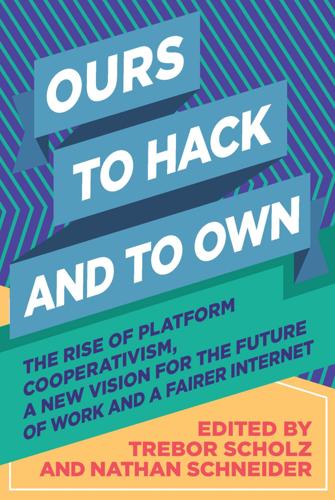
Ours to Hack and to Own: The Rise of Platform Cooperativism, a New Vision for the Future of Work and a Fairer Internet
by
Trebor Scholz
and
Nathan Schneider
Published 14 Aug 2017
Our bylaws also dictate that all profits are to be reinvested into the company. Coliga is the latest project of people behind Apoio, a self-organized community cleaning service, and Agora Collective, a leading creative space in Berlin. We’re part of the OuiShare community and won a 2015 OuiShare award in the category of collaborative economy. We also belong to Rooted Internet, which invests in purpose-driven companies. In the coming years we are going to build a diverse global community of like-minded peers to enable new forms of collaboration and resource sharing among networks. Project Name: CommunityOS: Callicoon Project Completed by: Ashley Taylor Location: Bushwick, Brooklyn, New York URL: futureculture.how/community-os-callicoon-project CommunityOS is a layer in the blockchain operating system.
…
Barcelona then provided these companies the possibility to negotiate 80 percent of the penalty if they allow the Social Emergency Housing Consortium to allocate empty apartments to residents with subsidized rent for three years. The city has called for a popular assembly for responsible tourism where citizens can discuss best practices and business models. The new government is also promoting new policies to foster a collaborative economy that generates social benefits locally. Besides these types of initiatives, Ada Colau has also promised a shift toward re-municipalization of infrastructure and public services. This is grounded in a very critical understanding of the neoliberal, surveillance-driven “smart city” model being promoted by big tech corporations.
…
In 2014, he was research director of the FLOK Society project, which produced the first integrated Commons Transition Plan for the government of Ecuador. His recent books are Save the World: Towards a Post Capitalist Society with P2P (with Jean Lievens, in French and Dutch); and Network Society and Future Scenarios for a Collaborative Economy (with Vasilis Kostakis; Palgrave Macmillan, 2014). Yochai Benkler is the Berkman Professor of Entrepreneurial Legal Studies at Harvard Law School, and faculty co-director of the Berkman Center for Internet and Society at Harvard University. Since the 1990s, he has played a role in characterizing the role of information commons and decentralized collaboration to innovation, information production, and freedom in the networked economy and society.
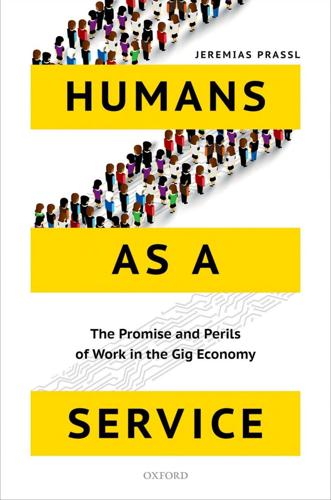
Humans as a Service: The Promise and Perils of Work in the Gig Economy
by
Jeremias Prassl
Published 7 May 2018
Writing in the New York Times, Natasha Singer expresses her problems with the industry’s twisting of language, from ‘sharing’ and ‘peer’, to the ‘people’ and ‘collaborative’ economy. What she objects to ‘is the terminology itself and how it frames technology-enabled transactions as if they were altruistic or community endeavors’.42 Sarah O’Connor at the Financial Times agrees: If there is one phrase that makes me wince more than the ‘sharing economy’ it is the ‘collaborative economy’ . . . What exactly is being shared here? Who is collaborating with whom? Freelancers on Upwork are no more sharing their skills with the world than I am sharing mine with the Financial Times.43 This is not to say that a few smaller platforms—including France’s BlaBlaCar, which coordinates intercity car journeys and pegs drivers’ earnings to esti- mated fuel consumption,44 or Canada’s BlancRide, which connects urban commuters45—have not experimented with genuine peer-to-peer services designed to cover costs, rather than to return significant profits.
…
In Texas, legislation stipulates that a TNC ‘does not control, direct, or manage’ its drivers, thus denying a key element in * * * 48 Doublespeak most employment law tests,64 and in North Carolina, a ‘rebuttable presump- tion exists that a TNC driver is an independent contractor and not an employee’.65 Similar lobbying efforts are by no means limited to the United States. A European Agenda for the Collaborative Economy, published by the European Commission in the summer of 2016, seemed to echo many of the industry’s positions. The non-binding guidance issued to the then 28 EU member states stopped short of denying sharing-economy workers’ employment sta- tus, but suggested that only platforms that controlled the price of services, set contractual terms, and owned ‘key assets used to provide the underlying service’ should be classified as service providers.66 Even those uncomfortable with the legislative classification of gig- economy workers as independent contractors eschew employment status.
…
North Carolina, General Assembly Session 2015, Session Law 2015–237, Senate Bill 541, §1, 5. 66. European Commission, Communication from the Commission to the European Parliament, the Council, the European Economic and Social Committee and the Committee of the Regions: A European Agenda for the Collaborative Economy (COM (2016) 356 final), 6, 11–13. The Advocate General of the Court of Justice of the European Union (CJEU) disagreed: Case C-434/15 Asóciacion Profesional Elite Taxi v Uber Systems Spain SL (Opinion of AG Szpunar, 11 May 2017). My initial analysis can be found at Jeremias Prassl, ‘Uber: the future of work . . . or just another taxi company?’
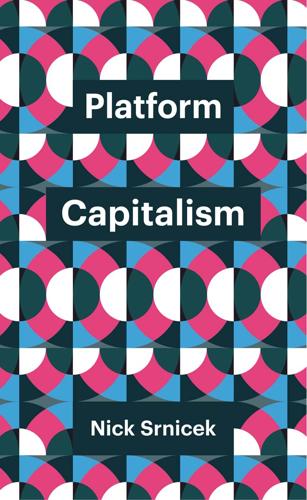
Platform Capitalism
by
Nick Srnicek
Published 22 Dec 2016
The Week, 22 January. http://theweek.com/articles/600523/rich-people-have-nowhere-money-serious-problem (accessed 4 June 2016). Srnicek, Nick, and Alex Williams. 2015. Inventing the Future: Postcapitalism and a World without Work. London: Verso. Stokes, Kathleen, Emma Clarence, Lauren Anderson, and April Rinne. 2014. Making Sense of the UK Collaborative Economy. London: Nesta. https://www.nesta.org.uk/sites/default/files/making_sense_of_the_uk_collaborative_economy_14.pdf (accessed 4 June 2016). Stucke, Maurice, and Allen Grunes. 2016. Big Data and Competition Policy. Oxford: Oxford University Press. Taylor, Edward. 2016. ‘Amazon, Microsoft Look for Big Data Role in Self-Driving Cars’. Reuters, 1 April. http://www.reuters.com/article/us-automakers-here-amazon-idUSKCN0WX2D8 (accessed 4 June 2016).
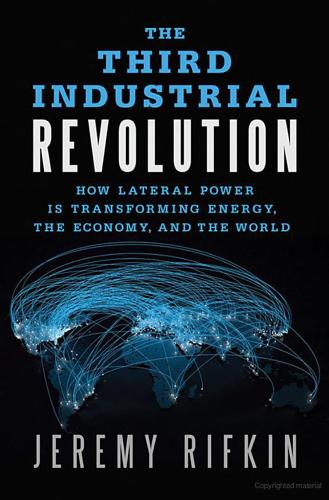
The Third Industrial Revolution: How Lateral Power Is Transforming Energy, the Economy, and the World
by
Jeremy Rifkin
Published 27 Sep 2011
While there is no denying that the living standards of millions of people is better at the end of the Second Industrial Revolution than at the beginning of the First Industrial Revolution, it is equally true that those on the top have benefited disproportionately from the Carbon Era, especially in the United States, where few restrictions have been put on the market and little effort made to ensure that the fruits of industrial commerce are broadly shared. THE COLLABORATIVE ECONOMY The emerging Third Industrial Revolution, by contrast, is organized around distributed renewable energies that are found everywhere and are, for the most part, free—sun, wind, hydro, geothermal heat, biomass, and ocean waves and tides. These dispersed energies will be collected at millions of local sites and then bundled and shared with others over intelligent power networks to achieve optimum energy levels and maintain a high-performing, sustainable economy.
…
For example, the right to navigate rivers, forage in local forests, walk on country lanes, fish in nearby streams, and congregate on the public square. This older idea of property as the right of access and inclusion was increasingly shunted aside in the modern era as market relations came to dominate life and private property came to define the “measure of a man.” In a distributed and collaborative economy, however, the right of access to global social networks becomes as important as the right to hold on to private property in national markets. That’s because quality-of-life values become more important, especially the pursuit of social inclusion with millions of others in global communities in virtual space.
…
Rethinking the framing concepts that govern education and the pedagogy that accompanies them will not be easy. Teachers around the world are only just now beginning to restructure the educational experience to make it relevant to young people who will need to learn how to live in a distributed and collaborative economy tucked inside a biosphere world. CHAPTER EIGHT A CLASSROOM MAKEOVER I was backstage, fidgeting with my five small note cards, thinking over the key points I wanted to emphasize in my talk. I peeked through the curtain and saw 1,600 high school teachers and state and federal education officials sitting in the audience—and not just any teachers, Advanced Placement teachers, the best high school teachers in America and the ones responsible for preparing the brightest students for college.
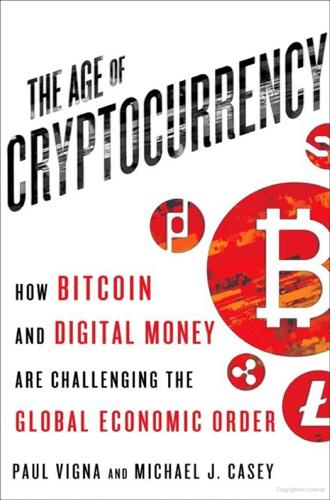
The Age of Cryptocurrency: How Bitcoin and Digital Money Are Challenging the Global Economic Order
by
Paul Vigna
and
Michael J. Casey
Published 27 Jan 2015
People have figured out that if they have idle assets, they can lend them to people who need them, while those people have in turn equally realized that they don’t need to go through expensive central distribution points to find those assets. This new system is called several things: the sharing economy, the mesh economy, the collaborative economy. Got some extra computing power sitting on your desktop? Share it with those who need it. Got a car sitting idle in your driveway? Share that. Got a big idea? Share it online and raise the money online to fund it. Business symbols of this era so far include the personal-apartment rental site Airbnb, the crowdfunding site Kickstarter, the peer-to-peer lending network Lending Club, and the taxi services controlled by individual car owners Uber and Lyft.
…
These new payment mechanisms, while technologically advanced, are still trapped in the five-hundred-year-old model of centralized financial management. That may not matter one iota to the average person using them, whose ambivalence could be enough to ensure that sovereign money survives, even as the collaborative economy of the future continues its drive toward individual empowerment in all other realms of the economy. But its survival would be inherently inconsistent with all the other sweeping, decentralizing shifts under way. It’s hard to get away from the idea that these trends point inevitably to an age of cryptocurrency, if not immediately, then a decade or so in the future.
…
From Silicon Valley, the impression is that human society is now ready to throw out the centralized system altogether and embrace a decentralized model run by “the crowd.” “Now the crowd has their own business model,” says Jeremiah Owyang, the founder of the consulting service Crowd Companies. Offering a broad definition of the collaborative economy that encompasses everything from barter to lending to gifting, Owyang suggests that the entire human populace is now taking charge of the means of production and changing the rules of the game. “They’re making their own freaking currencies, for God’s sake,” Owyang adds emphatically. But beyond these catchphrases, the picture is more nuanced.
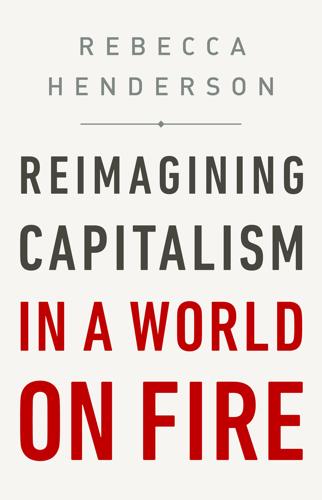
Reimagining Capitalism in a World on Fire
by
Rebecca Henderson
Published 27 Apr 2020
Robin Chase founded Zipcar—a car sharing service—in 2000, nearly twenty years ago, years before the rest of us discovered the sharing economy. She saw Zipcar as part of a much larger vision for how the economy might be transformed. In one interview she explained: The collaborative economy is larger than the sharing economy. The sharing economy feels to me like it’s about assets. The collaborative economy is everything. It’s making clear and visceral to us that, if I can have real-time access not just to hard assets, but to people, to networks, to experiences, it means that the way I do my own personal life is completely transformed.
…
We’re trying to initiate a virtuous circle, where the loans we make act as demonstration projects and there are spillover effects—so other people come into the space. We’re looking for trust—so we try not to be a typical bank that’s always out to make the best deal for itself. Clients come to us because we are a hub. We’re building a whole new set of skills in support of a much more collaborative economy. In summary, Triodos Bank is pursuing a classically purpose-driven strategy, using its focus on the broader community to catalyze the kind of architectural innovation that can change the whole system. The sixty-four thousand dollar question is whether these kinds of investors—investors who value the well-being of the planet over squeezing the maximum possible returns from their money—are a fringe group operating at the margins or the wave of the future.
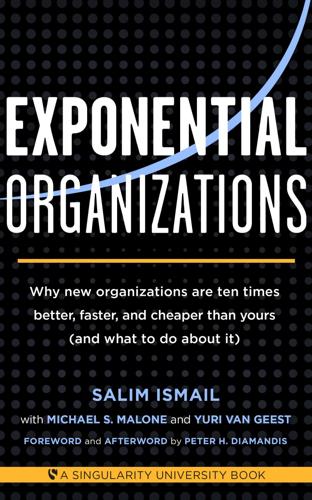
Exponential Organizations: Why New Organizations Are Ten Times Better, Faster, and Cheaper Than Yours (And What to Do About It)
by
Salim Ismail
and
Yuri van Geest
Published 17 Oct 2014
According to Owyang, Crowd Companies is a “brand council” whose activities include introductions, educational forums and networking with relevant startups, many of which are ExOs. Several dozen major brands have already joined the group, and Owyang believes that as this new breed of companies leveraging crowd dynamics spreads out across the world, they will in turn spark what he calls a Collaborative Economy (outlined below). Owyang has identified seventy-five crowd-based startups operating in six vertical markets. Lisa Gansky’s Mesh Labs takes this model to a much more granular level, listing nine thousand crowd-based startups in twenty-five categories. Such adoption of social media is not a fad.
…
Owyang isn’t alone in his thinking: Shel Israel, co-author of the book Age of Context: Mobile, Sensors, Data and the Future of Privacy, noted recently that there have been many such labels attached to this new movement: the Sharing Economy, the Mesh Economy, Collaborative Consumption and the Collaborative Economy. We actually think Exponential Organizations works quite well as a label. But whatever the ultimate designation, it is clear that ExO attributes can and are being implemented by large organizations. In fact, as we wrote this book we were surprised to see how fast that implementation is occurring.
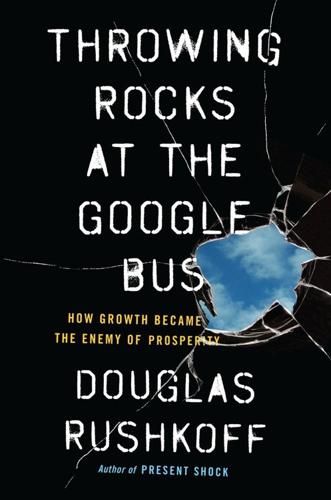
Throwing Rocks at the Google Bus: How Growth Became the Enemy of Prosperity
by
Douglas Rushkoff
Published 1 Mar 2016
Fairnopoly Team, “Dein Anteil,” info.fairmondo.de, May 14, 2012. 94. “Projekt10000—Gemeinsam unsere Wirtschaft verändern,” mitmachen.fairmondo.de/projekt10000/. 95. Felix Weth, “Genossenschaft 2.0,” info.fairmondo.de, February 12, 2013. 96. Vasilis Kostakis and Michel Bauwens, Network Society and Future Scenarios for a Collaborative Economy (London: Palgrave Macmillan, 2014). A draft is available at p2pfoundation.net, December 30, 2014. 97. Amanda B. Johnson, “La’Zooz: The Decentralized Proof-of-Movement ‘Uber’ Unveiled,” cointelegraph.com, October 19, 2014. 98. Trebor Scholz, “Platform Cooperativism vs. the Sharing Economy,” medium.com, December 5, 2014.
…
Kepos, Paula. International Directory of Company Histories, vol. 7. Farmington Hills, Mich.: St. James Press, 1993. Klein, Naomi. This Changes Everything: Capitalism vs. the Climate. New York: Simon and Schuster, 2014. Kostakis, Vasilis, and Michel Bauwens. Network Society and Future Scenarios for a Collaborative Economy. London: Palgrave Macmillan, 2014. Lanier, Jaron. Who Owns the Future? New York: Simon and Schuster, 2013. Lewis, Michael. The Big Short: Inside the Doomsday Machine. New York, London: W. W. Norton, 2011. Lietaer, Bernard A., and Stephen M. Belgin. Of Human Wealth: Beyond Greed & Scarcity.
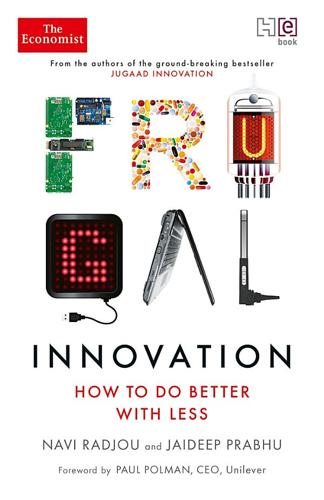
Frugal Innovation: How to Do Better With Less
by
Jaideep Prabhu Navi Radjou
Published 15 Feb 2015
Some 80 million Americans (around one-quarter of the US population) and 23 million Britons (nearly one-third of the population) consider themselves sharers; and in France 48% consider themselves to be active participants in the collaborative economy. US and European customers, across the generations, are sharing and collaborating more than ever to get the products, services, knowledge or capital they want, faster, better and cheaper than from traditional sources. The collaboration economy also gives consumers a more meaningful social experience. While baby-boomers and their offspring may view it as a cost-effective and convivial alternative to the brand-dominated mass-market economy, later generations see collaboration as the only way to consume.
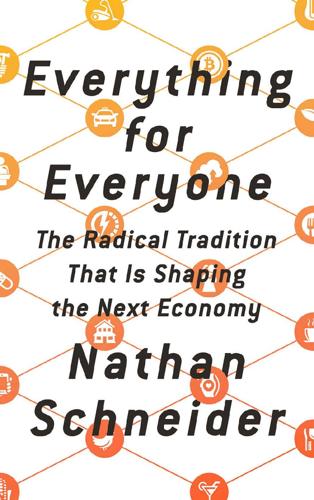
Everything for Everyone: The Radical Tradition That Is Shaping the Next Economy
by
Nathan Schneider
Published 10 Sep 2018
About a century later in Italy, Benedict of Nursia went further in his rule, stipulating, “As often as anything important is to be done in the monastery, the abbot shall call the whole community together,” discussing the matter with everyone before making a decision.10 The Rule of St. Benedict prescribes election of the abbot by the community and expects the community to support itself through shared businesses. Both rules emphasize obedience to the abbot or abbess over democratic deliberation. But they also enjoin an egalitarian spirit and a collaborative economy. The spirit of Acts returned in force during the thirteenth-century mendicant movement, when barefoot preachers spread across Europe, contrasting their poverty with the lavish lifestyles among church officials and in wealthy monasteries. Clare of Assisi, Francis of Assisi’s friend and colleague, enshrined in her rule for Franciscan sisters a particular measure of countercultural self-governance.
…
For more on such open accounting, see Michel Bauwens and Vasilis Niaros, Value in the Commons Economy: Developments in Open and Contributory Value Accounting (Heinrich-Böll-Foundation and P2P Foundation, 2017); this is tied, also, with the vision of “open cooperativism”: Michel Bauwens, “Open Cooperativism for the P2P Age,” P2P Foundation blog (June 16, 2014). 4. See Vasilis Kostakis and Michel Bauwens, Network Society and Future Scenarios for a Collaborative Economy (Palgrave Macmillan, 2014); Michel Bauwens, “Blueprint for P2P Society: The Partner State and Ethical Economy,” Shareable (April 7, 2012); John Restakis, Cooperative Commonwealth and the Partner State (The Next System Project, 2017). 5. Ibn Khaldun, The Muqaddimah: An Introduction to History, trans.
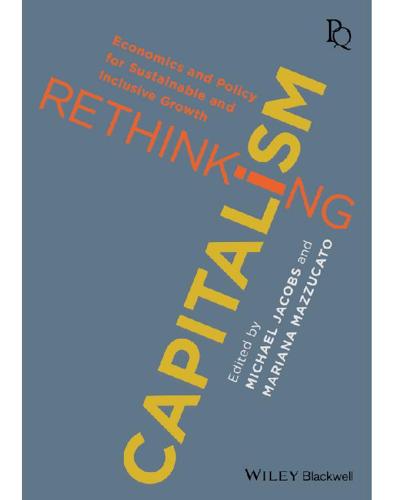
Rethinking Capitalism: Economics and Policy for Sustainable and Inclusive Growth
by
Michael Jacobs
and
Mariana Mazzucato
Published 31 Jul 2016
As numerous studies have shown in recent years, GDP has very limited meaning and is even distorting in the knowledge economy. New metrics need to be designed to account for the use of energy and materials and to measure the various ways in which value is now created and well-being enhanced. Facilitate the sharing and collaborative economies. The proliferation of free internet-based services has inspired many to innovate in networks of sharing access to possessions, exchanging time and collaborating in creative projects. This is one of the routes along which ICT enables a green economy grounded in sustainability and focused on services and personal care.
…
Move towards some form of basic income. Providing a minimum income in the advanced countries—such as the universal basic income currently being trialled in Finland, a negative income tax and/or workfare for community projects and services—is the necessary platform for encouraging the sharing and collaborative economies, the growth of voluntary organisations and of creative endeavours that could contribute to the quality of life both at the community level and through participation in global networks. In the ‘green good life’, well-being would increasingly be measured not by possessions, but by positive experiences of healthy living, community sharing and creative involvement in networking and group activities.
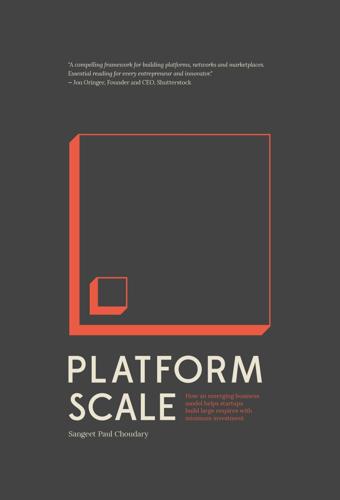
Platform Scale: How an Emerging Business Model Helps Startups Build Large Empires With Minimum Investment
by
Sangeet Paul Choudary
Published 14 Sep 2015
PLATFORM SCALE IMPERATIVE The age of the industrial economy accorded inordinate power to those who held the means of production. In the age of platforms, production is decentralized. Whether it is the decentralization of manufacturing through 3D printing, the decentralization of marketing and journalism through social media, or the decentralization of service providers in the collaborative economy, the means of production are no longer limited to large companies or entities. With decentralized production, the platforms that enable and aggregate this production are the new winners. In a platformed world, the people and processes that determine quality and quantity of value units determine success.
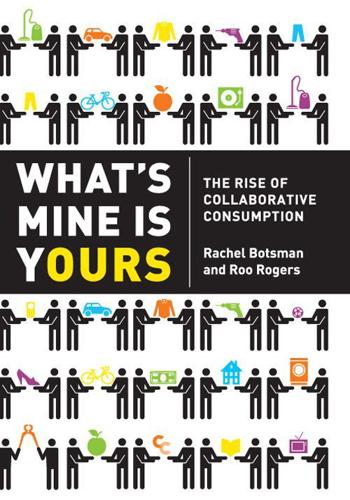
What's Mine Is Yours: How Collaborative Consumption Is Changing the Way We Live
by
Rachel Botsman
and
Roo Rogers
Published 2 Jan 2010
During his summer “off,” Duvall immersed himself in articles, books, and research on how digital tools and the Internet were disrupting industries. He believed that the “twin forces of technology and the will of the individual” would turn traditional business models upside down and radically transform the way people think and live toward a more collaborative economy. Duvall was particularly interested in the work of Carlota Perez, a leading economist at Cambridge University and an expert in technoeconomic paradigm shifts. Perez posits that every seventy years, a disruptive technology emerges that alters the foundations of the economy and the norms by which society constructs itself—our homes, our workplaces, our education system, the way we govern, how we spend our leisure time, and so on.
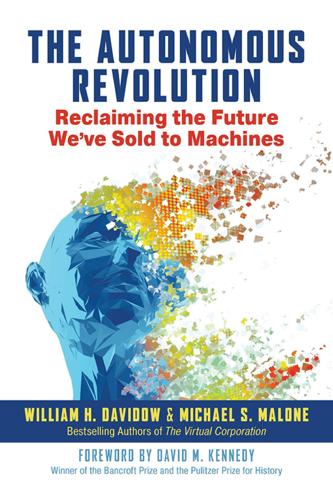
The Autonomous Revolution: Reclaiming the Future We’ve Sold to Machines
by
William Davidow
and
Michael Malone
Published 18 Feb 2020
The transformation that will take place in other service businesses with high information proxy content will be similar. A SHARED FUTURE Many of the most disruptive new business models will emerge in what has been called the sharing economy. Information equivalence is the primary driving force behind the sharing economy, which is also known as the shareconomy, collaborative consumption, collaborative economy, or peer economy. All of these terms are used to describe a broad range of economic activities.40 Arun Sundararajan does an excellent job of characterizing this phenomenon in his book, The Sharing Economy.41 The sharing economy, he writes, is market based and facilitates the efficient exchange and sharing of goods, services, and human skills.
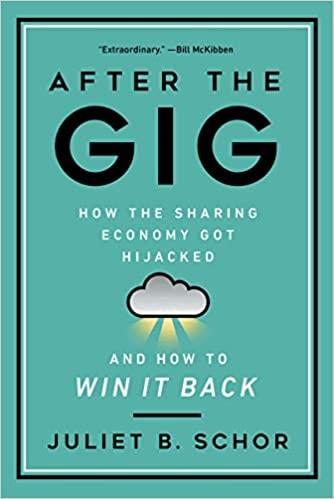
After the Gig: How the Sharing Economy Got Hijacked and How to Win It Back
by
Juliet Schor
,
William Attwood-Charles
and
Mehmet Cansoy
Published 15 Mar 2020
Center for a New American Dream. https://newdream.org/downloads/New_Dream_2014_Poll_Final_Analysis.pdf. Chan, Kelvin. 2019. “London Keeps Uber on Short License as It Scrutinizes Firm.” Associated Press, September 24, 2019. Chase, Robin. 2015. Peers Inc: How People and Platforms Are Inventing the Collaborative Economy and Reinventing Capitalism. New York: Headline/PublicAffairs. Chen, Julie Yujie. 2018. “Thrown under the Bus and Outrunning It! The Logic of Didi and Taxi Drivers’ Labour and Activism in the On-Demand Economy.” New Media & Society 20 (8): 2691–2711. Cherry, Miriam A. 2016. “Beyond Misclassification: The Digital Transformation of Work.”
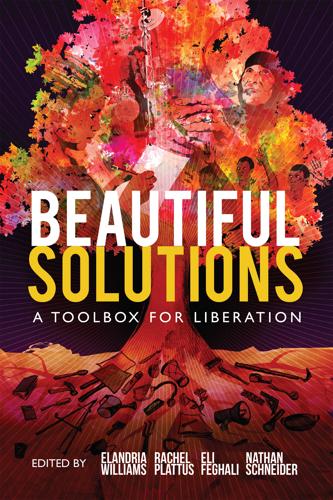
Beautiful Solutions: A Toolbox for Liberation
by
Elandria Williams, Eli Feghali, Rachel Plattus
and
Nathan Schneider
Published 15 Dec 2024
Baig-Viñas is a co-founder of Aragon Labs AG. From 2011 to 2019 he was a research engineer at the Guifi.net Foundation. WRITTEN BY THE BEAUTIFUL SOLUTIONS TEAM Guifi.net is explicit in its anti-capitalist motives. Its model disrupts the traditional telecommunications economy by fostering a collaborative economy and a commons. It rejects exploitation of user communities and favors a sustainable, mutually beneficial network infrastructure. The project sees internet and telecommunications access as a human right and aims to provide connectivity for groups who are traditionally excluded. The infrastructure and services provided by Guifi.net are funded by donations, loans, subsidies, and member payments.
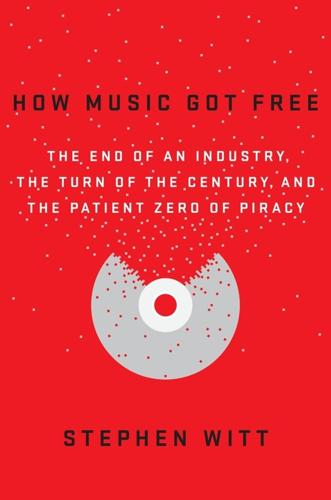
How Music Got Free: The End of an Industry, the Turn of the Century, and the Patient Zero of Piracy
by
Stephen Witt
Published 15 Jun 2015
For rates to stay positive we have to hoard almost everything in the world from the people that need it, if it is to have value. The artificial scarcity tactics that have been used through the ages to achieve this are getting harder to execute because of technological liberation—which is enabling the emergence of collaborative economy which bypasses rates of return. Perhaps another world was possible. But organizing it proved difficult, and only in one other country besides Sweden did the Pirate Party gain a foothold: Germany. There, it registered 30,000 members in the course of a couple of years, polling in the high single digits, winning representation in several state-level elections in 2011, and threatening to put members in the Bundestag.

The Age of Stagnation: Why Perpetual Growth Is Unattainable and the Global Economy Is in Peril
by
Satyajit Das
Published 9 Feb 2016
When they came for the trade unionists, I did not speak out; I was not a trade unionist. When they came for the Jews, I remained silent; I wasn't a Jew. When they came for me, there was no one left to speak out.” 7 Technology and innovation are touted as sources of future employment. The sharing economy (also known as the peer economy, collaborative economy, and gig economy) is based on the ubiquitous Internet, improved broadband connectivity, smartphones, and apps. Individuals with spare time, houses, rooms, cars, and the like can use them as sources of work and income. The economy that benefits everyone focuses on transport (Uber, Lyft, Sidecar, GetTaxi, Hailo), short-term accommodation (Airbnb, HomeAway), small tasks (TaskRabbit, Fiverr), grocery-shopping services (Instacart), home-cooked meals (Feastly), on-demand delivery services (Postmates, Favor), pet transport (DogVacay, Rover), car rental (RelayRides, Getaround), boat rental (Boatbound), and tool rental (Zilok).
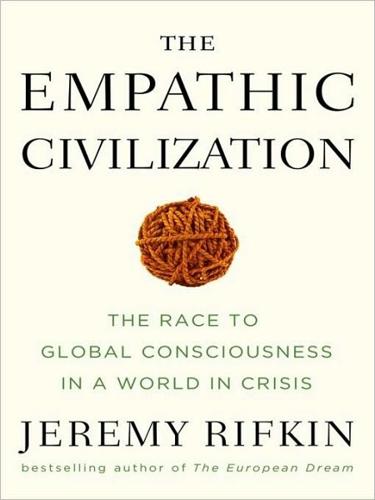
The Empathic Civilization: The Race to Global Consciousness in a World in Crisis
by
Jeremy Rifkin
Published 31 Dec 2009
A venture like Linux, for example, only works when the software, code, and new applications are openly shared among everyone in the network. FROM PROPERTY RIGHTS TO ACCESS RIGHTS Nowhere is the old classical economic paradigm and the new distributed capitalism model more at odds than when it comes to the notion of holding intellectual property. Patents and copyrights are sacrosanct in the traditional business scheme. In a collaborative economy, however, open-sourcing of critical information becomes essential to collaboration. Possessing and controlling knowledge thwarts collaboration. The struggle in the life-sciences sector over patents on genes is illustrative of the difference between traditional market-based capitalism and the new distributed capitalism.
…
Macpherson argues, in turn, that property needs to be redefined to include the “right to an immaterial revenue, a revenue of enjoyment of the quality of life.” He suggests that “such a revenue can only be reckoned as a right to participate in a satisfying set of social relations.”27 In a collaborative economy, the right of inclusion becomes more important in establishing economic and social relationships than the right of exclusion. As we’ve seen, traditional property rights, in the form of intellectual and real property, can act as a damper on the commercial and social possibilities opened up by the new distributed communications technologies and energies that make up the operating infrastructure of a Third Industrial Revolution economy.
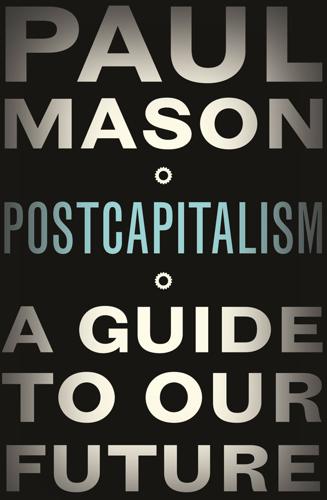
Postcapitalism: A Guide to Our Future
by
Paul Mason
Published 29 Jul 2015
‘Organisations and Markets’, Journal of Economic Perspectives, vol. 5 (2) (1991), pp. 25–44 2. E. Preobrazhensky, The New Economics (Oxford, 1964), p. 55 3. See, for example, P. Mason, ‘WTF is Eleni Haifa?’, 20 December 2014, http://www.versobooks.com/blogs/1801-wtf-is-eleni-haifa-a-new-essay-by-paul-mason 4. V. Kostakis and M. Bauwens, Network Society and Future Scenarios for a Collaborative Economy (London, 2014) 5. M. Wark, A Hacker Manifesto (Cambridge MA, 2004) 6. See, for example, ‘Fair Society, Healthy Lives’ (The Marmot Review), UCL Institute of Health Equity, February 2010, http://www.instituteofhealthequity.org/projects/fair-society-healthy-lives-the-marmot-review 7. J. D.

Virtual Competition
by
Ariel Ezrachi
and
Maurice E. Stucke
Published 30 Nov 2016
Note the distinction between the powerful super-platform, which we discuss in this chapter, and the more general definition of platform, which often encompasses online companies operating in two- or multisided markets. On the EU approach to platforms, see European Commission, Public Consultation on the Regulatory Environment for Platforms, Online Intermediaries, Data and Cloud Computing and the Collaborative Economy (September 24, 2015), https://ec.europa.eu/digital-agenda/en/news/public-consultation -regulatory-environment-platforms-online-intermediaries-data-and-cloud. Notes to Pages 149–151 309 10. Don Clark and Robert McMillan, “Facebook, Amazon and Other Tech Giants Tighten Grip on Internet Economy,” Wall Street Journal, November 5, 2015, http://www.wsj.com/articles/giants-tighten-grip-on-internet-economy -1446771732. 11.
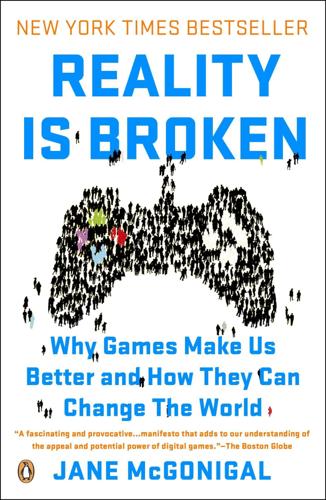
Reality Is Broken: Why Games Make Us Better and How They Can Change the World
by
Jane McGonigal
Published 20 Jan 2011
Let’s take a look at two more extraordinarily ambitious projects that are attempting to harness the social capacity of crowds: Groundcrew, a mobile people-organizing platform that allows you to make real-life wishes come true, and Lost Joules, an online energy conservation game that invites you to make virtual currency wagers on just how much social good other players can accomplish. GROUNDCREW—POWERING THE MOBILE COLLABORATION ECONOMY The best way to explain the wish-granting Groundcrew project, developed by Cambridge, Massachusetts-based social entrepreneur Joe Edelman, is by looking first at the project’s inspiration, one of the best-selling computer games of all time: the life-simulation game The Sims. When you play The Sims, your job is to keep your simulated people healthy and happy.